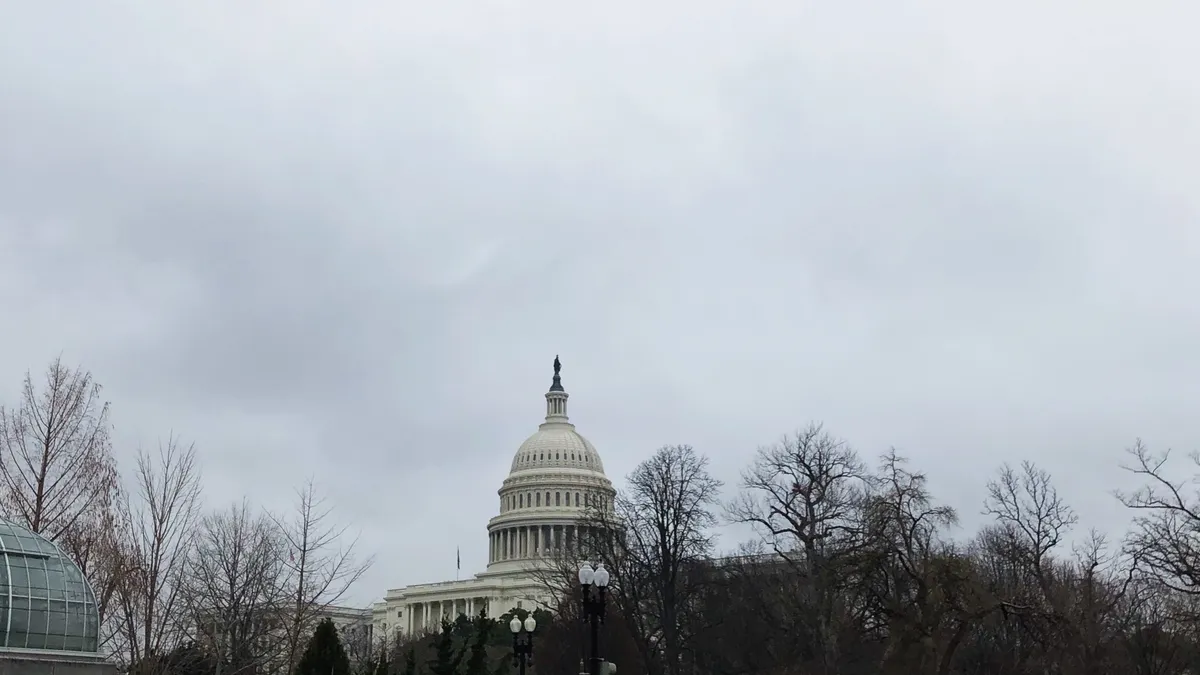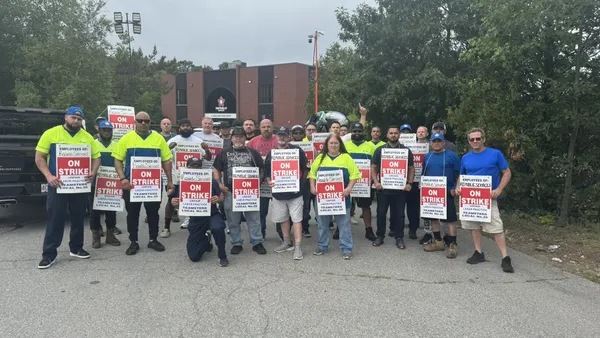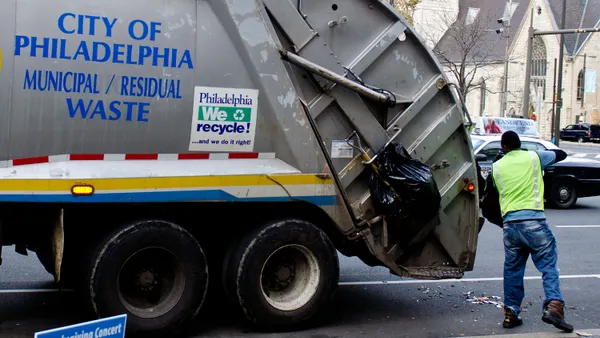Dive Brief:
- Recycling re-emerged as a focus area for Congress on Wednesday during a Senate Committee on Environment and Public Works (EPW) hearing. Billed as a session "responding to the challenges facing recycling in the United States," the two-hour event centered around recycling infrastructure challenges with the backdrop of the coronavirus pandemic, along with scrutiny of plastics.
- Speakers included Closed Loop Partners Managing Director Bridget Croke, More Recycling CEO Nina Bellucci Butler, and Meghan Stasz, vice president of packaging and sustainability for the Consumer Brands Association (CBA). Stasz said in prepared remarks the current state of U.S. recycling is hindering industry goals and reaching fully recycled packaging by 2030 is "unachievable" at present. Croke pushed for tax incentives and other mechanisms to spur market demand for recycled plastics and other packaging materials.
- Sen. Tom Udall (D-NM) also testified in favor of his bill, the Break Free From Plastic Pollution Act, which would ban and phase out many single-use plastics while creating a national container deposit system and recycled content minimums. Butler similarly expressed support for extended producer responsibility (EPR) policies. Chairman John Barrasso (R-Wyo.), however, countered with support for single-use plastics, citing their heightened use during the pandemic.
Dive Insight:
Momentum around recent federal scrutiny of recycling slowed as the pandemic took hold in mid-March, leaving some in the industry concerned that prior attention to the sector would dim due to the global crisis. While the U.S. EPA did not take part on Wednesday, the agency has emphasized recycling as an important focus area. Congress has also held a number of hearings centered on the issue, including a House event in early March focused on the role of the federal government in recycling.
The June 17 hearing restored some of that focus, with an emphasis on issues raised by the pandemic, including the temporary suspension of municipal curbside programs.
"[Recycling] is a very bipartisan issue," said Sen. John Boozman (R-Ark.), calling it "low-hanging fruit" for lawmakers.
Differences over how to address issues like plastic pollution still played out during the hearing, with added context due to the pandemic. While advising that person-to-person contact is more likely to transmit the coronavirus rather than surface-to-person contact, the Centers for Disease Control and Prevention (CDC) has issued guidance for establishments to prioritize single-use options for customers. A number of states and municipalities have also suspended plastic bag bans or banned reusable alternatives, citing health concerns.
Barrasso, the chairman, pointed to moves like these and repeatedly said single-use plastics play a "critical role" in protecting public health. Stasz, of CBA, agreed, stating the pandemic has shown "there is a real need for a range of packaging materials."
But problems in the recycling system leave municipalities struggling to manage "a suffocating amount of plastic waste," Udall said, touting his bill as a solution to those problems. Sen. Sheldon Whitehouse (D-RI) called plastics recycling a "whopping failure" and said the business community is lagging behind on addressing the issue.
Butler of More Recycling said many plastics are essential, but called for an overhaul in broader recycling infrastructure. "It's simply unethical to make something that nature cannot absorb and not provide a system to manage it," she said.
A number of groups submitted testimony for the Wednesday hearing, including The Recycling Partnership (TRP), the Glass Packaging Institute (GPI), the Solid Waste Association of North America (SWANA), and the Association of Plastic Recyclers.
SWANA CEO David Biderman noted the lack of direct waste and recycling industry voices during the hearing. "The perspective of the industry that actually collects and manages recyclables was important for the EPW committee to hear," he told Waste Dive.
In a statement to Waste Dive, National Waste and Recycling Association CEO Darrell Smith thanked lawmakers for the hearing and drawing attention to recyclables as feedstock. "Just as important, though, is ensuring that we have the necessary domestic recycling infrastructure to meet the demand," said Smith, calling for federal tax credits, waivers, and grants.
The hearing comes amid a growing push to include waste and recycling legislation in federal relief aid responding to the pandemic. Those efforts first drew widespread attention when a group of stakeholders — including major plastics groups and organizations like TRP, SWANA, and GPI— sent a letter to Congress in May asking lawmakers to include the RECOVER Act in any future infrastructure aid package.
Other groups have indicated they would be open to including the education-focused RECYCLE Act in an aid package. Environmental organizations and non-profit recyclers, including Eureka Recycling and Eco-Cycle, signed onto a letter asking lawmakers to pass the Break Free From Plastic Pollution Act instead of RECOVER.
GPI and SWANA renewed their support for RECYCLE and RECOVER in their testimony on Wednesday. In submitted remarks, Biderman highlighted the impacts of the pandemic and concerns about the stalled momentum of federal recycling legislation. Biderman called the delay "entirely understandable," but said the impacts of the pandemic on the industry have been stark and require assistance. In his testimony, GPI President Scott DeFife encouraged "all Committee members to consider co-sponsorship and support of both bills."
Apart from Udall's bill, specific pieces of legislation did not factor heavily into the hearing. But Biderman expressed optimism in his comments to Waste Dive that the hearing indicated some focus might be returning to the industry and long-running problems regarding infrastructure and public education.
With additional reporting by Cole Rosengren










